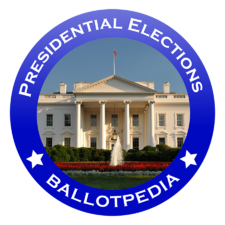Topics and participation in the ABC Democratic debate (December 2015)
Ballotpedia's scope changes periodically, and this article type is no longer actively created or maintained. If you would like to help our coverage grow, consider donating to Ballotpedia.
Date: November 8, 2016 |
Winner: Donald Trump (R) Hillary Clinton (D) • Jill Stein (G) • Gary Johnson (L) • Vice presidential candidates |
Important dates • Nominating process • Ballotpedia's 2016 Battleground Poll • Polls • Debates • Presidential election by state • Ratings and scorecards |
2028 • 2024 • 2020 • 2016 Have you subscribed yet?
Join the hundreds of thousands of readers trusting Ballotpedia to keep them up to date with the latest political news. Sign up for the Daily Brew.
|
This article analyzes the central themes of the third Democratic presidential debate held on December 19, 2015, in Manchester, New Hampshire. The transcript prepared by The Washington Post was used to measure candidate participation and audience engagement.[1] Footage from the debate was consulted where there were ambiguities in the text.
To compare the statistics of this debate to those of the previous Democratic debate, see the analysis of the CBS Democratic debate in November 2015.
Segments
The third Democratic presidential debate featured 18 unique discussion segments covering national security and foreign policy. These discussion segments were measured by any shift in the theme of a discussion prompted by one of the moderators: David Muir and Martha Raddatz. The candidates also fielded questions from Neil Levesque, Josh McElveen and Dan Tuohy.
- Opening statements
- Democratic National Committee data breach
- Domestic terror threats
- Terrorism and gun control legislation
- Banning Muslims from entering the U.S. and profiling
- National security and privacy
- Syrian refugee crisis
- Ground strategy in Iraq and Syria
- Income inequality
- Regulation of corporations and Wall Street
- Healthcare reform
- Student loan reform
- Taxes and the middle class
- Criminal justice reform and police-community relations
- Heroin epidemic
- Regime change and instability in Libya
- Duties of the president's spouse
- Closing statements
Overall participation
Participation in a discussion segment was defined as a substantive comment related to the discussion segment's topic. Jokes and attempts to gain permission from a moderator to speak were not considered participatory speech acts. In some instances, candidates who participated in a discussion segment diverted from the prompted topic. Hillary Clinton was the only candidate to participate in every discussion segment.
Candidate participation by behavior
Participation in the debate was also measured by the candidate's behavior at the start of each discussion segment. This study considered whether a candidate was initially prompted to speak during a discussion segment by a moderator or whether he or she independently engaged in the discussion segment by interrupting another candidate or calling on the moderator for permission to speak. A candidate's conduct after they joined a discussion segment was not considered.
As in the second Democratic debate, one-third of Martin O'Malley's participation in the debate came after he interjected himself into the discussion. Bernie Sanders also interjected himself into two discussion segments. He attempted to join the discussion segment on the Syrian refugee crisis, but was prevented by Raddatz. She said, "We're going to move on to the fight against ISIS. You're the one who told us we have to follow the rules and break it off."[1]
Candidate participation by speaking time
According to speaking time estimates from Politico, Clinton spoke the longest for 40.9 minutes. This was four minutes longer than Sanders and ten minutes longer than O'Malley.[2]
Candidate participation by speaking rate
Each candidate's speaking rate was calculated by comparing the total word count of his or her participation in the debate against his or her speaking time as measured by Politico.[2] Clinton spoke the quickest at 166 words per minute. By comparison, every Republican candidate spoke at a faster speaking rate during the fifth Republican debate held on December 15, 2015.
Candidate participation by segment vs. speaking time
The amount of time a candidate spoke did not necessarily align with the number of issues he or she covered during the debate. In this debate, each candidate's participation across discussion segments was nearly equally distributed.
Candidate participation by speaking order
This study also calculated the number of times a candidate spoke first, second or third during a discussion segment, whether prompted by a moderator with a question or invitation to rebut or by interjection.
Clinton was most frequently asked to speak first by a wide margin. O'Malley, in comparison, was never asked to speak first at the start of a new discussion segment.
Audience engagement
Audience engagement was measured by noting the instances of applause, cheering or laughter in The Washington Post's transcript. Footage from the debate was consulted where it was ambiguous in the text who the audience was responding to.
With 32 separate instances of applause and laughter, Sanders received the warmest response from the crowd. A quarter of this audience engagement occurred during the discussion segment on regulating corporations and Wall Street. One-third of Clinton's audience engagement came from her comments on domestic terrorism and ISIS.[1]
Candidate speech analysis
|
|
|
See also
- Presidential candidates, 2016
- Presidential election, 2016/Polls
- 2016 presidential candidate ratings and scorecards
- Presidential election, 2016/Straw polls
Footnotes
| |||||||||||







